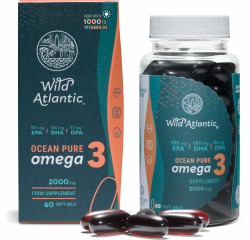What Depletes Omega 3 in the Body?
Omega-3 fatty acids are essential for numerous bodily functions, particularly for maintaining cardiovascular and brain health. However, various factors can deplete these vital nutrients from the body, impacting overall health. This article explores the different factors that can lead to a reduction in omega-3 levels and provides insights on how to mitigate these effects.
Dietary Imbalance
A significant factor contributing to omega-3 depletion is a diet high in omega-6 fatty acids and low in omega-3s. Omega-6 fatty acids are found in many processed foods, vegetable oils, and snacks. While both omega-6 and omega-3 are essential fatty acids, the typical Western diet tends to have a much higher ratio of omega-6 to omega-3, leading to an imbalance that can deplete omega-3 levels.
Omega-6 to Omega-3 Ratio
| Diet | Omega-6:Omega-3 Ratio |
|---|---|
| Western Diet | 15:1 to 20:1 |
| Recommended Ratio | 4:1 or lower |
Stress and Omega-3 Levels
Chronic stress is another significant factor that can deplete omega-3 fatty acids. Stress increases the production of cortisol, a hormone that can affect the body’s metabolism and reduce the availability of omega-3s. High levels of stress can also lead to poor dietary choices, further exacerbating the depletion of these essential fats.
Poor Gut Health
Gut health plays a crucial role in the absorption and utilization of nutrients, including omega-3 fatty acids. Conditions like leaky gut syndrome, inflammatory bowel disease (IBD), and other digestive disorders can impair the body’s ability to absorb omega-3s efficiently, leading to lower levels in the bloodstream.
Exposure to Environmental Toxins
Exposure to environmental toxins, such as heavy metals, pesticides, and pollutants, can also contribute to the depletion of omega-3 fatty acids. These toxins can cause oxidative stress and inflammation, which in turn can reduce the availability and effectiveness of omega-3s in the body.
Inflammation and Chronic Diseases
Chronic inflammation and diseases such as diabetes, cardiovascular disease, and autoimmune disorders can lead to an increased demand for omega-3 fatty acids. The body’s effort to counteract inflammation uses up omega-3s more rapidly, depleting their levels over time. This creates a cycle where low omega-3 levels further exacerbate inflammation and disease progression.
Alcohol and Omega-3 Depletion
Excessive alcohol consumption is another factor that can deplete omega-3 levels. Alcohol can interfere with the body’s ability to absorb and metabolize essential nutrients, including omega-3 fatty acids. It also contributes to liver damage, which can further impair nutrient absorption and utilization.
Aging and Nutrient Absorption
As people age, their ability to absorb and utilize nutrients, including omega-3 fatty acids, declines. This can be due to a variety of factors, such as decreased digestive efficiency, changes in diet, and the presence of chronic health conditions. Ensuring adequate intake of omega-3s through diet and supplementation becomes increasingly important with age.
How to Maintain Healthy Omega-3 Levels
To counteract the depletion of omega-3 fatty acids, consider the following strategies:
- Balanced Diet: Aim for a balanced diet that includes a variety of omega-3-rich foods, such as fatty fish (salmon, mackerel, sardines), flaxseeds, chia seeds, and walnuts. Reduce intake of omega-6-rich foods to maintain a healthier omega-6 to omega-3 ratio.
- Stress Management: Engage in stress-reducing activities such as yoga, meditation, and regular exercise to help maintain healthy omega-3 levels.
- Gut Health: Support gut health with a diet rich in fiber, probiotics, and fermented foods to improve nutrient absorption.
- Avoid Toxins: Minimize exposure to environmental toxins by choosing organic produce, using natural cleaning products, and reducing plastic use.
- Moderate Alcohol Consumption: Limit alcohol intake to support overall health and nutrient absorption.
- Supplementation: Consider omega-3 supplements, especially if dietary intake is insufficient. Fish oil and algae-based supplements are effective options.
Conclusion
Maintaining healthy levels of omega-3 fatty acids is crucial for overall well-being, especially for brain and cardiovascular health. There are various factors that deplete omega 3 levels including stress, poor gut health and environmental toxins. By understanding the factors that deplete omega-3s and taking proactive steps to counteract these effects, you can support your body’s need for these essential fats. For more information on the importance of omega-3s and how to incorporate them into your lifestyle, explore articles such as Benefits of Omega-3 for Kids and Teens and How and When to Take Omega-3.
References
[1] Johnson, T. “The Impact of Diet on Omega-3 Levels,” Journal of Nutrition, 2021.
[2] Harris, W. “Omega-3 Fatty Acids and Stress Management,” Stress and Health, 2019.
[3] Miller, S. “Gut Health and Nutrient Absorption,” Journal of Gastroenterology, 2020.
[4] Brown, A. “Environmental Toxins and Omega-3 Depletion,” Environmental Health Perspectives, 2018.





























